沪教版六年级英语上册知识点
沪教牛津版版六年级上册英语 Module 4 知识清单
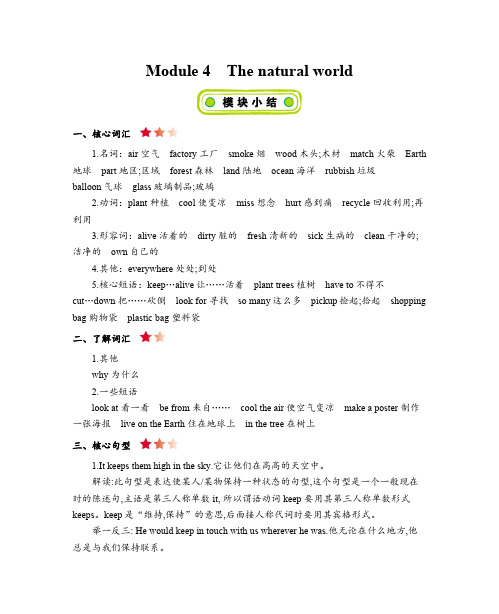
Module 4 The natural world一、核心词汇 1.名词:air 空气 factory 工厂 smoke 烟 wood 木头;木材 match 火柴 Earth 地球 part 地区;区域 forest 森林 land 陆地 ocean 海洋 rubbish 垃圾balloon气球 glass玻璃制品;玻璃2.动词:plant 种植 cool 使变凉 miss 想念 hurt 感到痛 recycle 回收利用;再利用3.形容词:alive 活着的 dirty 脏的 fresh 清新的 sick 生病的 clean 干净的;洁净的 own自己的4.其他:everywhere 处处;到处5.核心短语:keep…alive让……活着 plant trees 植树 have to不得不cut…down 把……砍倒 look for 寻找 so many这么多 pickup捡起;拾起 shopping bag 购物袋 plastic bag 塑料袋二、了解词汇 1.其他why 为什么2.一些短语look at 看一看 be from 来自…… cool the air 使空气变凉 make a poster 制作一张海报 live on the Earth 住在地球上 in the tree 在树上三、核心句型 1.It keeps them high in the sky.它让他们在高高的天空中。
解读:此句型是表达使某人/某物保持一种状态的句型,这个句型是一个一般现在时的陈述句,主语是第三人称单数it, 所以谓语动词keep 要用其第三人称单数形式keeps。
keep是“维持,保持”的意思,后面接人称代词时要用其宾格形式。
举一反三: He would keep in touch with us wherever he was.他无论在什么地方,他总是与我们保持联系。
Will you keep us the seats?你给我们保留些座位,好吗?It keeps me sticking into my heart. 它使我的心不能忘却!2.We get wood from trees. 我们从树上获得木头。
六年级英语上册Unit 8-11复习资料(沪教版)

六年级英语上册Unit 8-11复习资料(沪教版)本资料为woRD文档,请点击下载地址下载全文下载地址Unit8Thefoodweeat.dinnermenu晚餐菜单2.cabbagesoup卷心菜汤3.chickensoup鸡汤4.friedcabbage炒卷心菜5.steamedprawnswithgarlic蒜蓉蒸虾6.steamedfish清蒸鱼7.friedeggswithbacon熏肉炒蛋8.friedchickenwings炸鸡翅9.boiledeggs水煮蛋0.bakedpotato烤土豆1.tomatoandeggsoup番茄蛋汤2.afterdinner晚餐后3.whatkindof…什么种类的。
4.needtodosth.需要做某事5.wouldlikenoodlesfordinner 晚餐想吃面条6.likeseafood喜欢海鲜7.inthemarket在市场8.inthesupermarket在超市9.atthefishstall在鱼摊20.inthefruitsection在水果部门21.freezev.冰冻,结冰frozenadj.冰冻的freezingadj.极冷的e.g.frozenfood冷冻食品freezingweather严寒的天气22.liketoeatdumplings喜欢吃饺子23.apacketof一包/袋24.twohamburgers两个汉堡包25.fruitsalad水果色拉语言点.forbreakfast/lunch/supper/dinnerwhatwouldyoulikefordinnertonight?今天晚饭你们想吃什么?for在这里表目的,用途tonight=thiseveninglastnight=yesterdayevening2.’d=would‘d是would的缩写形式。
wouldlikesth.=wantsth.想要某物wouldliketodosth.=wouldlovetodosth.=wanttodosth.想要做某事likesth.喜欢某物liketodosth./likedoingsth.喜欢做某事Iwouldlikesomeapples.我想要一些苹果。
沪教牛津版六年级英语上册Module 4 The natural world 知识点清单
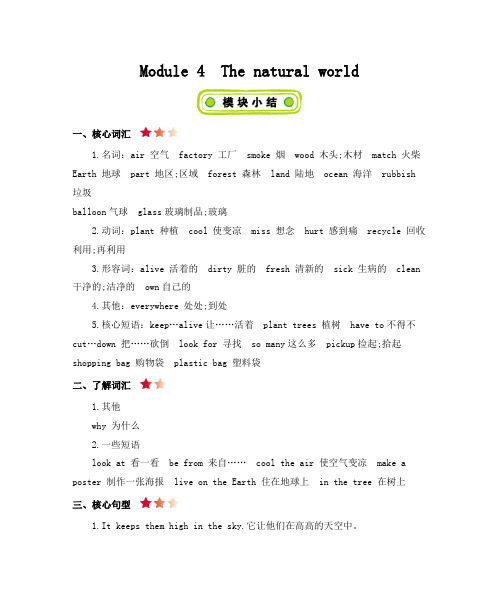
Module 4 The natural world一、核心词汇1.名词:air 空气factory 工厂smoke 烟wood 木头;木材match 火柴Earth 地球part 地区;区域forest 森林land 陆地ocean 海洋rubbish 垃圾balloon气球glass玻璃制品;玻璃2.动词:plant 种植cool 使变凉miss 想念hurt 感到痛recycle 回收利用;再利用3.形容词:alive 活着的dirty 脏的fresh 清新的sick 生病的clean 干净的;洁净的own自己的4.其他:everywhere 处处;到处5.核心短语:keep…alive让……活着plant trees 植树have to不得不cut…down 把……砍倒look for 寻找so many这么多pickup捡起;拾起shopping bag 购物袋plastic bag 塑料袋二、了解词汇1.其他why 为什么2.一些短语look at 看一看be from 来自……cool the air 使空气变凉make a poster 制作一张海报live on the Earth 住在地球上in the tree 在树上三、核心句型1.It keeps them high in the sky.它让他们在高高的天空中。
解读:此句型是表达使某人/某物保持一种状态的句型,这个句型是一个一般现在时的陈述句,主语是第三人称单数it, 所以谓语动词keep 要用其第三人称单数形式keeps。
keep是“维持,保持”的意思,后面接人称代词时要用其宾格形式。
举一反三: He would keep in touch with us wherever he was.他无论在什么地方,他总是与我们保持联系。
Will you keep us the seats?你给我们保留些座位,好吗?It keeps me sticking into my heart. 它使我的心不能忘却!2.We get wood from trees. 我们从树上获得木头。
沪教版英语六年级上册词汇

沪教版六年级上册词汇Unit 1month 一个月的时间;月份cute 可爱的pretty 漂亮的handsome英俊的;帅气的turtle 乌龟catch 逮住;捕捉fly 苍蝇grow up 长大;成长junior high school 初级中学(be) born 出生Unit 2famous 著名的;出名的during 在⋯⋯期间spend 度过everyone每个人;所有人 countryside 乡村;农村 pick 采摘summer holiday 暑假Unit 3healthy 健康的;有益于健康的unhealthy 不健康的;损害健康的hamburger 汉堡包cola 可乐yesterday 昨天fruit 水果pie 馅饼pizza 比萨饼sandwich 三明治vegetable蔬菜chicken 鸡肉chocolate 巧克力a little 少量的fish and chips 炸鱼薯条Unit 4neighbor 邻居son 儿子daughter女儿noisy 吵闹的owl 猫头鹰dig 挖(土);掘(洞)make noise 制造噪音Unit 5thousand 一千hundred 一百wild 野生环境;野生的South China tiger 华南虎blue whale 蓝鲸way 路;方式;方法die 死;死亡rhino 犀牛learn 学会;学习send 安排去;寄;送in danger 面临危险in the past 在过去take care of 照顾;照料go for a walk 去散步drive away 赶走Unit 6e-friend 网友country 国家other 其他的team (游戏或运动的)队hobby 业余爱好grade 年级yourself 你自己would like (表示愿意、喜欢)Unit 7shall (表示提出或征求意见)princess公主police 警方;警察部门exciting 令人激动的;使人兴奋的brave 勇敢的policeman 警察(复数policemen)boring 没趣的;令人厌倦的queen 王后mirror 镜子fairest 最美丽的kill 杀死asleep睡着的next time 下次once upon a time从前fall asleep 睡着Unit 8bee 蜜蜂insect 昆虫ant 蚂蚁anything 任何东西air 空气kind 种类everywhere 处处;到处finger 手指alive 活着的dancer 跳舞者;舞蹈演员balloon 气球insect museum 昆虫博物馆factory 工厂car museum汽车博物馆smoke 烟model car 汽车模型dirty 脏的science museum科学博物馆clean 干净的;洁净的many kinds of 各种各样的hurt 感到痛fresh 清新的Unit 9plant 种植capital 首都keep ⋯ alive 让⋯⋯⋯活着north 北;北部plant trees植树east 东;东部west 西;西部Unit 11south 南;南部wood 木头;木材palace王宫;宫殿cool 使变凉most 大多数match 火柴tourist 游客miss 想念building 建筑物;楼房have to 不得不sushi寿司(日本食物)cut ⋯ down把⋯⋯看倒in the north of 在⋯⋯北部look for 寻找in the east of 在⋯⋯东部Unit 12Unit 10Earth 地球part 地区;区域forest 森林land 陆地ocean海洋rubbish 垃圾sick 生病的recycle 回收利用;再利用glass玻璃制品;玻璃own 自己的so many 这么多pick up 捡起;拾起shopping bag购物袋plastic bag塑料袋。
沪教版六年级上册英语Unit 3 Healthy or unhealthy讲义(教师版)
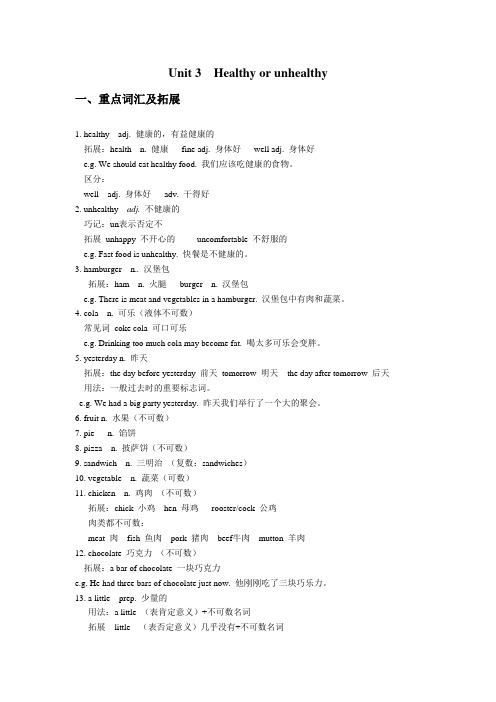
Unit 3 Healthy or unhealthy一、重点词汇及拓展1. healthy adj. 健康的,有益健康的拓展:health n. 健康fine adj. 身体好well adj. 身体好e.g. We should eat healthy food. 我们应该吃健康的食物。
区分:well adj. 身体好adv. 干得好2. unhealthy adj.不健康的巧记:un表示否定不拓展unhappy 不开心的uncomfortable 不舒服的e.g. Fast food is unhealthy. 快餐是不健康的。
3. hamburger n..汉堡包拓展:ham n. 火腿burger n. 汉堡包e.g. There is meat and vegetables in a hamburger. 汉堡包中有肉和蔬菜。
4. cola n. 可乐(液体不可数)常见词coke cola 可口可乐e.g. Drinking too much cola may become fat. 喝太多可乐会变胖。
5. yesterday n.昨天拓展:the day before yesterday 前天tomorrow 明天the day after tomorrow 后天用法:一般过去时的重要标志词。
e.g. We had a big party yesterday. 昨天我们举行了一个大的聚会。
6. fruit n. 水果(不可数)7. pie n. 馅饼8. pizza n. 披萨饼(不可数)9. sandwich n. 三明治(复数:sandwiches)10. vegetable n. 蔬菜(可数)11. chicken n. 鸡肉(不可数)拓展:chick 小鸡hen 母鸡rooster/cock 公鸡肉类都不可数:meat 肉fish 鱼肉pork 猪肉beef牛肉mutton 羊肉12. chocolate 巧克力(不可数)拓展:a bar of chocolate 一块巧克力e.g. He had three bars of chocolate just now. 他刚刚吃了三块巧乐力。
沪教版六年级上册英语Unit7 Seeing a film 讲义(教师版)
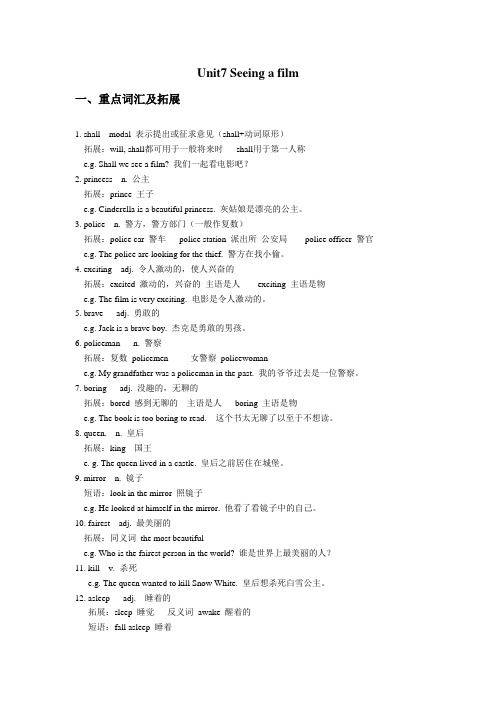
Unit7 Seeing a film一、重点词汇及拓展1. shall modal 表示提出或征求意见(shall+动词原形)拓展:will, shall都可用于一般将来时shall用于第一人称e.g. Shall we see a film? 我们一起看电影吧?2. princess n. 公主拓展:prince 王子e.g. Cinderella is a beautiful princess. 灰姑娘是漂亮的公主。
3. police n. 警方,警方部门(一般作复数)拓展:police car 警车police station 派出所公安局police officer 警官e.g. The police are looking for the thief. 警方在找小偷。
4. exciting adj. 令人激动的,使人兴奋的拓展:excited 激动的,兴奋的主语是人exciting 主语是物e.g. The film is very exciting. 电影是令人激动的。
5. brave adj. 勇敢的e.g. Jack is a brave boy. 杰克是勇敢的男孩。
6. policeman n. 警察拓展:复数policemen 女警察policewomane.g. My grandfather was a policeman in the past. 我的爷爷过去是一位警察。
7. boring adj. 没趣的,无聊的拓展:bored 感到无聊的主语是人boring 主语是物e.g. The book is too boring to read. 这个书太无聊了以至于不想读。
8. queen. n. 皇后拓展:king 国王e. g. The queen lived in a castle. 皇后之前居住在城堡。
9. mirror n. 镜子短语:look in the mirror 照镜子e.g. He looked at himself in the mirror. 他看了看镜子中的自己。
六年级上册沪教版英语第十一单元笔记

六年级上册沪教版英语第十一单元笔记第一部分:单词及词组1. discuss (v.) - 讨论2. respect (v.) - 尊重3. agreement (n.) - 协议4. interrupt (v.) - 打扰5. promise (v.) - 承诺6. argue (v.) - 争论7. opinion (n.) - 意见8.promise (n.) - 妥协9. disagreement (n.) - 分歧10. calm down (v. phr.) - 冷静下来第二部分:重要句型及表达1. What's your opinion? - 你的意见是什么?2. I disagree with you. - 我不同意你的观点。
3. Let's discuss it. - 让我们讨论一下。
4. I promise not to interrupt. - 我保证不打扰。
5. We need to find apromise. - 我们需要找到一个妥协的办法。
6. Can we agree on that? - 我们可以达成一致意见吗?第三部分:课文内容概要及重点本单元主要围绕着讨论和解决分歧展开,学生们通过课文中的对话和活动学习如何尊重他人的意见、妥协和解决纠纷。
课文内容以图文结合的形式呈现,通过图片和对话帮助学生理解并掌握相关词汇和句型。
重点在于引导学生学会与他人进行有效的交流和协商,培养他们的解决问题的能力。
第四部分:课文学习策略及实践1. 鼓励学生积极参与课堂讨论,提高他们的口头表达能力。
2. 带领学生分组进行小组讨论和角色扮演,模拟解决冲突的场景,加深学生对于课文内容的理解和应用。
3. 引导学生在日常生活中运用所学习的表达方式,与家人和同学进行交流,积极解决问题和分歧。
4. 配合课外阅读,让学生了解不同国家和文化间的交流方式,拓宽视野,增强跨文化交流的能力。
第五部分:课文学习反思及评价本单元的课文内容涵盖了重要的语言知识和交际技能,帮助学生在语言表达和人际交往方面得到全面提高。
牛津沪教版英语六年级上Unit7-10重点知识点复习教案
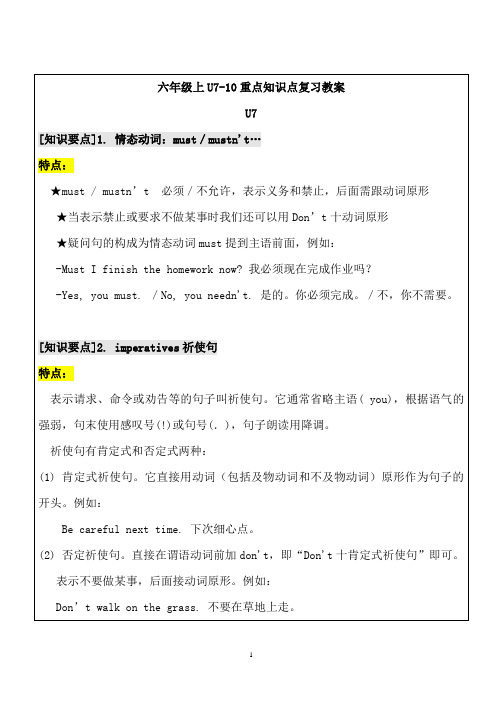
六年级上U7-10重点知识点复习教案U7[知识要点]1. 情态动词:must/mustn't…特点:★must / mustn’t 必须/不允许,表示义务和禁止,后面需跟动词原形★当表示禁止或要求不做某事时我们还可以用Don’t十动词原形★疑问句的构成为情态动词must提到主语前面,例如:-Must I finish the homework now? 我必须现在完成作业吗?-Yes, you must. /No, you needn't. 是的。
你必须完成。
/不,你不需要。
[知识要点]2. imperatives祈使句特点:表示请求、命令或劝告等的句子叫祈使句。
它通常省略主语( you),根据语气的强弱,句末使用感叹号(!)或句号(.),句子朗读用降调。
祈使句有肯定式和否定式两种:(1) 肯定式祈使句。
它直接用动词(包括及物动词和不及物动词)原形作为句子的开头。
例如:Be careful next time. 下次细心点。
(2) 否定祈使句。
直接在谓语动词前加don't,即“Don't十肯定式祈使句”即可。
表示不要做某事,后面接动词原形。
例如:Don’t walk on the grass. 不要在草地上走。
易错易混练I. Choose the best answer. (选择最佳答案)( ) 1. We mustn't ______ loudly in the public places.A. speakB. tellC. talkD. ask( )2. Everyone should not______________the class rules.A. breaksB. brokeC. breakD. breaking( ) 3. Please don't be late school again, Sandy.A. toB. forC. fromD. with ( )4. If you want to enter the room, the_______________is on the left.A. entranceB. windowC. classD. exit( )5. Many people are _____ the bus at the bus station now.A. wait forB. waits forC. waited forD. waitingforII. Choose the right word to complete the sentence. (选择适当的词填空)1. —I want to buy a pair of new shoes.—Please _________ ( go upstair; go upstairs).2. ____________________ Please don't eat (in; or) drink in the library.3. _________________ What's the ( mean; meaning ) of the word?4. _____________________ Please don't chase (others; each other) inthe classroom.U8[知识要点]1. present perfect tense 现在完成时特点:(1)现在完成时的构成是:have(has)+过去分词,表示继续、完了、结果和经验等四种意思。
- 1、下载文档前请自行甄别文档内容的完整性,平台不提供额外的编辑、内容补充、找答案等附加服务。
- 2、"仅部分预览"的文档,不可在线预览部分如存在完整性等问题,可反馈申请退款(可完整预览的文档不适用该条件!)。
- 3、如文档侵犯您的权益,请联系客服反馈,我们会尽快为您处理(人工客服工作时间:9:00-18:30)。
沪教版六年级英语上册知识点
一、单词和短语
1. 数字:one, two, three, four, five, six, seven, eight, nine, ten
2. 问候语:hello, hi, good morning, good afternoon, goodbye
3. 介绍自己:My name is…, I am… years old, I am from...
4. 家庭成员:father, mother, brother, sister, grandparents
5. 动物:cat, dog, bird, rabbit, fish
6. 学校:classroom, teacher, student, desk, chair
7. 食物:apple, banana, orange, milk, bread
8. 颜色:red, yellow, blue, green, pink
9. 运动:football, basketball, swimming, running, cycling
二、重点语法
1. 一般现在时:主语+动词原形
例如:
- My mother cooks dinner every day.
- We play basketball on Sundays.
- I like to eat apples.
2. 情态动词 can 的用法:表示能力或许可例如:
- I can swim in the pool.
- Can you speak Chinese?
- She can play the piano very well.
3. 名词所有格的用法:'s 或'
例如:
- Tom's backpack is blue.
- The dog's tail is wagging.
- My parents' car is new.
三、句型
1. 问候语句
- Hello, how are you?
- Hi, good morning!
- Good afternoon, nice to meet you.
2. 自我介绍句
- My name is Lisa. I am 11 years old.
- I am from China.
- I have one brother and one sister.
3. 询问其他人情况
- How old are you?
- Where are you from?
- Do you have any hobbies?
4. 描述动物外貌特征
- The cat is small and gray.
- The dog has long ears.
- The bird has colorful feathers.
5. 谈论学校事物
- Our classroom is clean and tidy.
- The teacher is standing in front of the class. - The students are sitting at their desks.
6. 询问食物偏好
- What is your favorite food?
- Do you like to eat bananas?
- I prefer to drink milk.
7. 描述颜色
- The apple is red.
- The banana is yellow.
- The sky is blue.
8. 谈论运动爱好
- I like to play football.
- She enjoys swimming in the pool.
- They often run in the park.
四、实用句型
1. How do you do?(你好,很高兴认识你。
)
2. What's your name?(你叫什么名字?)
3. Where are you from?(你来自哪里?)
4. Can you...?(你能...吗?)
5. How old are you?(你多大了?)
6. I have...(我有...)
7. My favorite food is...(我最喜欢的食物是...)
8. I like to...(我喜欢...)
以上是沪教版六年级英语上册的一些重要知识点,包括单词和
短语、语法、句型等。
通过掌握这些知识点,你将能够更好地学
习和运用英语,提升自己的语言能力。
希望这些知识对你有帮助!。
